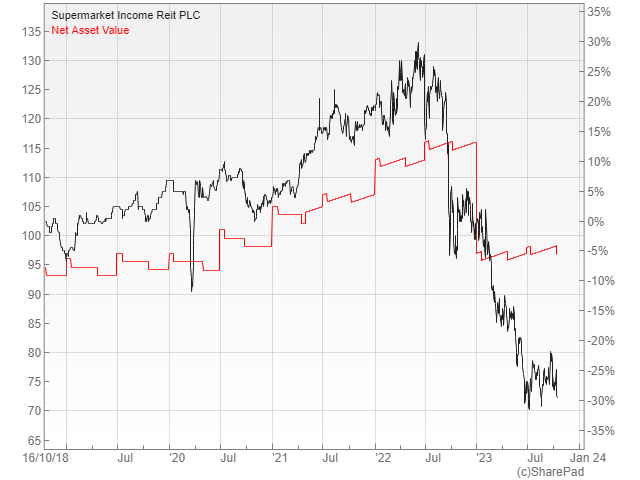Supermarket Income REIT: An 8% Yield With The Prospect Of Dividend Growth

Most Real-Estate Investment Trusts (REITs) have had a tough time of it in the last year or so, as the sharp rise in interest rates has put pressure on their valuations and yields. The £935m Supermarket Income (LON: SUPR) is no exception with the shares down over 40% from their all-time high achieved in May 2022, but they could be due a re-rating once UK interest rates have peaked.
SUPR invests in a portfolio of omnichannel stores, which are supermarkets that provide in-store shopping, but also operate as last mile online grocery fulfilment centres for home delivery and click and collect. These sites are critical to the operations of the UK’s leading grocers.
The 55 stores in the portfolio have long leases and are in strategic locations with attractive site sizes. These provide the fund with long-dated, secure income streams and benefit from upward only rental uplifts, which are typically index-linked.
This makes Supermarket Income a unique proposition that should be immune to void periods and bad debts, even in the event of a recession. However, this hasn’t been enough to stop the shares from sliding to a 22% discount to the end of June NAV, with the prospective yield rising to eight percent.
Difficult Year
According to its annual results for the year to the end of June, theEPRA NTA per share fell by 19% to 93 pence, while the share price total return was -34% due to a widening of the discount. The main problem was the negative impact of rising interest rates on portfolio valuations, although this was partially offset by the inflation-linked rent reviews.
During the reporting period the fund sold its interest in 21 supermarkets held in the Sainsbury’s Reversion Portfolio for £430.9m, thereby delivering a 30% internal rate of return. It also acquired a further 11 supermarkets for £399m, including two after the end of the financial year.
At the end of June the portfolio was valued at £1.69bn, with a weighted average unexpired lease term (WAULT) of 14 years. After adjusting for all the post balance sheet events, the net loan-to-value ratio was 34% and the debt was fully hedged, with the weighted average finance cost fixed at 3.1%.
The annual rent was £100.6m, up from £77.6m the year before and was collected in full with 100% occupancy. Almost 80% of the income is inflation-linked, although it is subject to an average cap of four percent.
Wide Discount And Attractive Yield
Adjusted earnings per share fell from 5.9p to 5.8p, while the dividend was increased from 5.94p to six pence, meaning that the cover was just 0.97 times. A target dividend of 6.06p per share for the 2024 financial year has also been announced.
The broker Winterflood says thatthe year to 30 June 2023 was a ‘year of two halves’ for Supermarket Income, with valuations remaining flat during the second six months. They note the fact that the dividend was not fully covered, but expect to see earnings growth as a result of the fund’s inflation-linked rent reviews.
Based on the target dividend of 6.06p the shares now offer a prospective yield of 8.4%, which Winterflood describe as attractive, even in the current higher interest rate environment, especially as the fund offers the prospect of dividend growth. They also think that the discount of 22% offers value for long-term investors, as they wouldn’t be surprised to see a re-rating in the fund’s shares once UK interest rates have peaked.
The wider long lease peer group offers an average yield of 7.7% and trades on a discount of 24%, but doesn’t benefit from the reliability and resilience of a client base made up entirely of large, established supermarkets.

Comments (0)